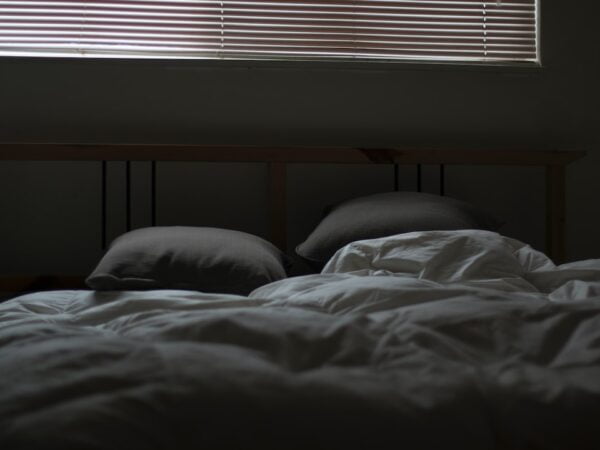
Sweet Dreams: How to Improve Your Sleep Quality and Wake Up Refreshed
Sleep is an essential part of our lives, as it plays a crucial role in maintaining our overall health and well-being. It is during sleep that our bodies repair and rejuvenate themselves, allowing us to wake up feeling refreshed and ready to take on the day. However, in today’s fast-paced world, many people prioritize work and other responsibilities over getting enough sleep, leading to a chronic sleep deprivation epidemic.
The negative effects of sleep deprivation cannot be overstated. Lack of quality sleep can lead to a wide range of physical and mental health problems. It impairs cognitive function, making it difficult to concentrate and make decisions. It also weakens the immune system, making us more susceptible to illnesses. Additionally, chronic sleep deprivation has been linked to an increased risk of developing chronic conditions such as obesity, diabetes, and cardiovascular disease.
Key Takeaways
- Quality sleep is crucial for overall health and well-being.
- Understanding the science of sleep can help improve sleep habits.
- Common sleep disorders can have negative effects on physical and mental health.
- Creating a comfortable sleep environment can promote better sleep.
- Diet, exercise, relaxation techniques, and natural remedies can all contribute to better sleep hygiene.
Understanding the Science of Sleep
To understand the importance of quality sleep, it is essential to understand the different stages of sleep and the role of circadian rhythms in regulating our sleep-wake cycle. Sleep is divided into two main categories: rapid eye movement (REM) sleep and non-rapid eye movement (NREM) sleep.
NREM sleep consists of three stages: N1, N2, and N3. N1 is the lightest stage of sleep, where we transition from being awake to falling asleep. N2 is a deeper stage of sleep where our brain waves slow down, and our body temperature drops. N3 is the deepest stage of sleep, also known as slow-wave sleep (SWS), where our body repairs itself and releases growth hormones.
REM sleep is the stage where most dreaming occurs. During REM sleep, our brain activity increases, and our eyes move rapidly beneath our eyelids. This stage is crucial for memory consolidation and emotional regulation.
Circadian rhythms are internal biological processes that regulate our sleep-wake cycle. They are influenced by external factors such as light and darkness. When our circadian rhythms are disrupted, it can lead to sleep disorders such as insomnia or shift work sleep disorder.
Common Sleep Disorders and Their Effects
There are several common sleep disorders that can significantly impact our physical and mental health. Insomnia is the most prevalent sleep disorder, characterized by difficulty falling asleep or staying asleep. It can be caused by stress, anxiety, or certain medical conditions.
Sleep apnea is another common sleep disorder, characterized by pauses in breathing during sleep. This can lead to loud snoring, daytime fatigue, and an increased risk of developing cardiovascular problems.
Restless legs syndrome (RLS) is a neurological disorder that causes an uncontrollable urge to move the legs, often accompanied by uncomfortable sensations. This can make it difficult to fall asleep and stay asleep.
Narcolepsy is a chronic neurological disorder that affects the brain’s ability to regulate sleep-wake cycles. People with narcolepsy often experience excessive daytime sleepiness and sudden episodes of muscle weakness or paralysis.
The effects of sleep disorders on physical and mental health can be significant. Chronic sleep deprivation can lead to an increased risk of developing mental health conditions such as depression and anxiety. It can also impair cognitive function, making it difficult to concentrate and perform daily tasks. Additionally, sleep disorders have been linked to an increased risk of developing chronic conditions such as obesity, diabetes, and cardiovascular disease.
Creating the Perfect Sleep Environment
| Factors | Recommendations |
|---|---|
| Temperature | Keep the room cool, between 60-67°F (15-19°C) |
| Noise | Use earplugs or white noise machine to block out unwanted sounds |
| Light | Use blackout curtains or eye masks to create a dark environment |
| Bedding | Choose comfortable and breathable sheets, pillows and blankets |
| Bedroom | Keep the bedroom clean, clutter-free and dedicated to sleep |
| Technology | Avoid using electronic devices before bedtime and keep them out of the bedroom |
Creating the perfect sleep environment is essential for getting a good night’s sleep. The ideal temperature for sleep is between 60-67 degrees Fahrenheit (15-19 degrees Celsius). It is also important to have a dark room, as exposure to light can disrupt our circadian rhythms and make it difficult to fall asleep. Investing in blackout curtains or wearing a sleep mask can help create a dark environment.
Noise level is another crucial factor in creating a comfortable sleep environment. Some people prefer complete silence, while others find white noise or soothing sounds such as rain or ocean waves helpful for falling asleep. Experimenting with different noise levels and finding what works best for you can greatly improve the quality of your sleep.
Comfortable bedding and a supportive mattress are also essential for a good night’s sleep. Investing in high-quality pillows and a mattress that suits your sleeping style can make a significant difference in your sleep quality.
The Impact of Diet and Exercise on Sleep
Diet and exercise play a significant role in our sleep quality. Eating a healthy, balanced diet can promote better sleep. Avoiding heavy meals close to bedtime can prevent indigestion and discomfort that can interfere with sleep. Additionally, certain foods contain nutrients that promote better sleep, such as magnesium, which can be found in leafy greens, nuts, and seeds.
Regular exercise has been shown to improve sleep quality. Engaging in physical activity during the day can help regulate our circadian rhythms and promote deeper, more restful sleep at night. However, it is important to avoid exercising too close to bedtime, as it can increase alertness and make it difficult to fall asleep.
Relaxation Techniques for Better Sleep
Incorporating relaxation techniques into our bedtime routine can greatly improve our sleep quality. Meditation is a powerful tool for calming the mind and promoting relaxation. Taking a few minutes to sit quietly and focus on your breath can help reduce stress and anxiety, making it easier to fall asleep.
Deep breathing exercises are another effective relaxation technique. Taking slow, deep breaths in through the nose and out through the mouth can activate the body’s relaxation response and promote better sleep.
Progressive muscle relaxation involves tensing and then releasing each muscle group in the body, starting from the toes and working your way up to the head. This technique helps release tension from the body and promotes physical relaxation.
Natural Remedies for Insomnia
There are several natural remedies that can help improve sleep quality and alleviate insomnia. Herbal teas such as chamomile, lavender, and valerian root have been used for centuries to promote relaxation and better sleep. These teas can be consumed before bedtime to help calm the mind and prepare the body for sleep.
Aromatherapy is another natural remedy that can promote better sleep. Essential oils such as lavender, chamomile, and bergamot have calming properties that can help reduce anxiety and promote relaxation. These oils can be diffused in the bedroom or applied topically before bedtime.
Melatonin is a hormone that regulates the sleep-wake cycle. Taking a melatonin supplement before bedtime can help regulate sleep patterns and improve sleep quality, especially for those who have difficulty falling asleep.
The Role of Technology in Sleep
Technology has become an integral part of our lives, but it can have a negative impact on our sleep quality. The blue light emitted by electronic devices such as smartphones, tablets, and computers can suppress the production of melatonin, making it difficult to fall asleep. Additionally, the constant stimulation from social media and other online activities can keep our minds active and make it difficult to wind down before bedtime.
To reduce the negative effects of technology on sleep, it is important to establish a technology-free zone in the bedroom. This means keeping electronic devices out of the bedroom and avoiding their use at least an hour before bedtime. Instead, engage in relaxing activities such as reading a book or taking a warm bath to prepare your mind and body for sleep.
Sleep Hygiene: Tips for Better Sleep Habits
Maintaining good sleep hygiene is essential for getting quality sleep on a consistent basis. Here are some tips for better sleep habits:
1. Stick to a consistent sleep schedule: Go to bed and wake up at the same time every day, even on weekends. This helps regulate your body’s internal clock and promotes better sleep.
2. Create a bedtime routine: Establish a relaxing routine before bed to signal to your body that it is time to wind down. This can include activities such as reading, taking a warm bath, or practicing relaxation techniques.
3. Limit caffeine and alcohol intake: Avoid consuming caffeine and alcohol close to bedtime, as they can interfere with sleep quality.
4. Create a comfortable sleep environment: Ensure that your bedroom is dark, quiet, and at a comfortable temperature for sleep.
5. Avoid napping late in the day: If you need to take a nap, limit it to 20-30 minutes and avoid napping late in the day, as it can interfere with nighttime sleep.
6. Manage stress: Find healthy ways to manage stress, such as practicing relaxation techniques or engaging in activities that you enjoy.
Sweet Dreams Await You
In conclusion, prioritizing quality sleep is essential for our overall health and well-being. Lack of sleep can have detrimental effects on our physical and mental health, impairing cognitive function and increasing the risk of developing chronic conditions. By understanding the science of sleep, creating a comfortable sleep environment, maintaining a healthy diet and exercise routine, incorporating relaxation techniques into our bedtime routine, and practicing good sleep hygiene, we can improve our sleep quality and wake up feeling refreshed and rejuvenated. Sweet dreams await you!
FAQs
What is sleep quality?
Sleep quality refers to the overall effectiveness and satisfaction of your sleep. It is determined by factors such as the amount of time spent asleep, the depth of sleep, and how rested you feel upon waking up.
Why is sleep quality important?
Sleep quality is important because it affects your physical and mental health. Poor sleep quality can lead to fatigue, irritability, and difficulty concentrating. It can also increase the risk of developing chronic health conditions such as obesity, diabetes, and heart disease.
What are some tips for improving sleep quality?
Some tips for improving sleep quality include establishing a regular sleep schedule, creating a relaxing bedtime routine, avoiding caffeine and alcohol before bedtime, keeping your bedroom cool and dark, and limiting screen time before bed.
What are some common sleep disorders that can affect sleep quality?
Some common sleep disorders that can affect sleep quality include insomnia, sleep apnea, restless leg syndrome, and narcolepsy.
When should I seek medical help for sleep problems?
You should seek medical help for sleep problems if they persist for more than a few weeks and are affecting your daily life. Your doctor may refer you to a sleep specialist for further evaluation and treatment.


















